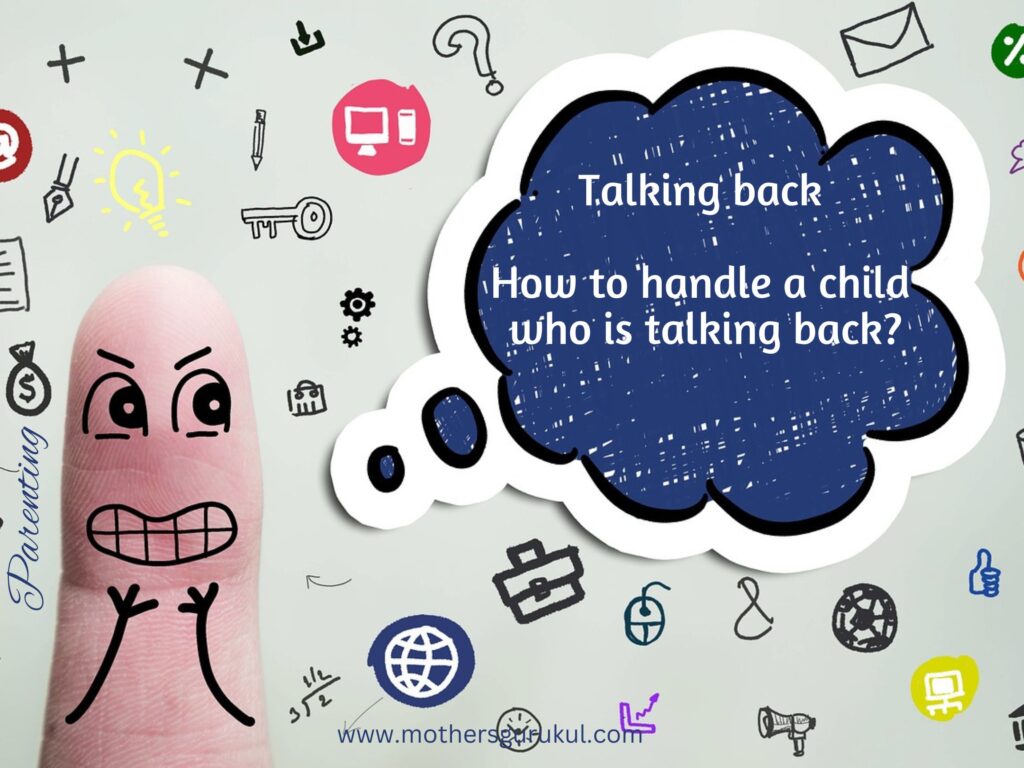Recently, I met two friends whose kids are of different ages. During our light conversation, they mentioned their kids picking up the habit of talking back. I was under the impression that kids talk back when they become teenage. When they get old, they can think independently and have their own views. Sometimes, they even try to act like adults, and in that flow, they start arguing with their parents. But lately, I have heard parents of young kids mentioning this habit quite frequently. I gave it a thought and decided to write about it.
Before we discuss what we can do when kids talk back, let’s first understand why they talk back. There can be several reasons.
- They may be tired
- They had a bad day
- They are copying someone
- They are trying our limits
- It gives them a sense of control
Irrespective of age, every child goes through these above-mentioned points. The most common reason for their extreme behavior is they don’t know how to handle their emotions. They see directions and instructions about what they should or shouldn’t do, how they should behave or talk, coming their way all day. Sometimes, it gets too much, and they don’t know how to cope with their emotions. They look for a vent, and talking back gives them that vent.
Talking back is a normal part of child development that can happen at any age, starting as early as when a toddler master the word “No!”
So, the question is – “We understand there are some odd days when our children do not behave as usual. But can we let it continue?” Off course not. Here is my answer:

How to handle a child who is talking back?
Stay calm:
“What? How can I stay calm when my child is talking back? By doing this, am I not encouraging an unacceptable behavior?” I hear you. But stay calm and speak in a normal and steady voice. Reacting in a rude way will increase the conflict. Instead, responding in a calm and steady voice will tell them that they have done something wrong and you do not support their behavior. But it will also tell them that there is a way to express and put forward your thoughts.
Knowing the root cause:
Before reacting, look for the root cause of back talking. Are they imitating their adults? Did something that happened at their school? Are they irritated because of some reason that they are not able to express in words? Once we know the root cause, it is easy to address the behavior. But just because they had a bad day doesn’t mean they can behave whichever way they want. We need to set some boundaries.
Setting boundaries:
As parents, we must set internal and external boundaries. Every house has some rules which each member has to follow. If parents talk to their kids in a calm and loving voice, then children are expected to talk to their parents with respect. There is a thin line between argument and discussion. Parents should make it clear to their children that they are ready for an open discussion. They will not entertain unnecessary arguments or arrogance. “I will not listen when you talk like that. I’ll listen when you speak with respectful words.” Give your child simple and specific instructions about what you expect and won’t tolerate.
Similarly, if you want to stop a specific word or behavior, name it and tell them what you want them to do instead. Setting such boundaries, staying consistent, and giving clear directions are always important.
Related article: Why do we need boundaries?
Explaining the better way of using control:
As discussed in the reasons for talking back, it gives children a sense of control. We have to tell our children that if they want to enjoy this sense of control, there are other ways. They can take small responsibilities and enjoy this feeling.
Praise good behavior:
When they act responsibly or nicely, don’t forget to praise them. Kids love it when we acknowledge their good behavior. Give them a hug and words of encouragement. Tell them exactly what you like so they know the importance of kind behavior.
Cut down negative influence:
These days, TV has a big role to play in children’s learning. But be watchful of what they are watching. Nowadays, kid’s shows are made in a sassy way. It is obvious for them to get carried away and copy their favorite characters. Sit with them and explain to them that everything they are watching on TV is not real and is not always acceptable in real life. Help them to make the best use of the technology.
Related article: Can my parental screen time affect my child’s development?
Wrap up!
When a child starts talking back, it is challenging for all parents. Addressing it in its initial stages will help you set your expectations. Despite everything you do, your child is likely to say rude and disrespectful things at times. So, practice to remain calm and respectful, no matter how frustrated or upset you are. This way, you will demonstrate a mature way of handling such situations. Sometimes, actions speak louder than words.
